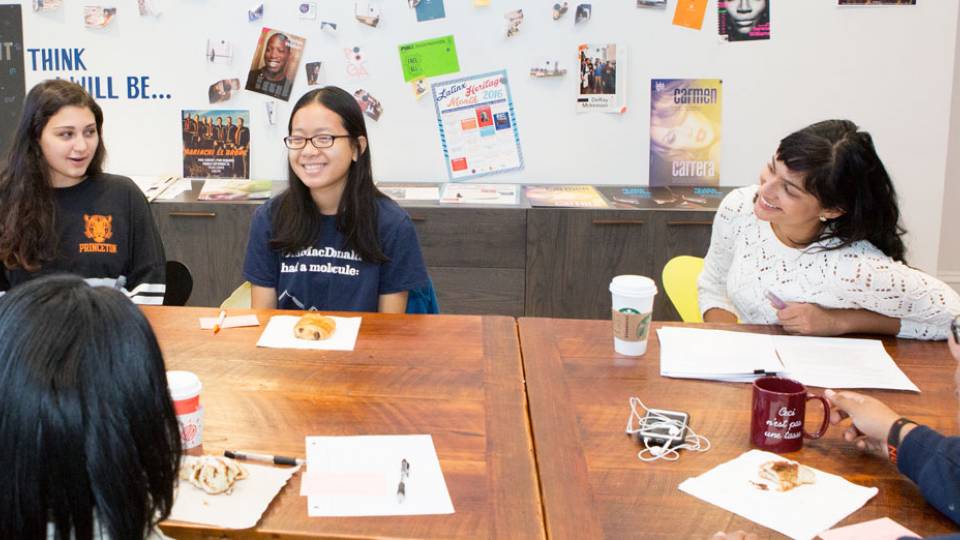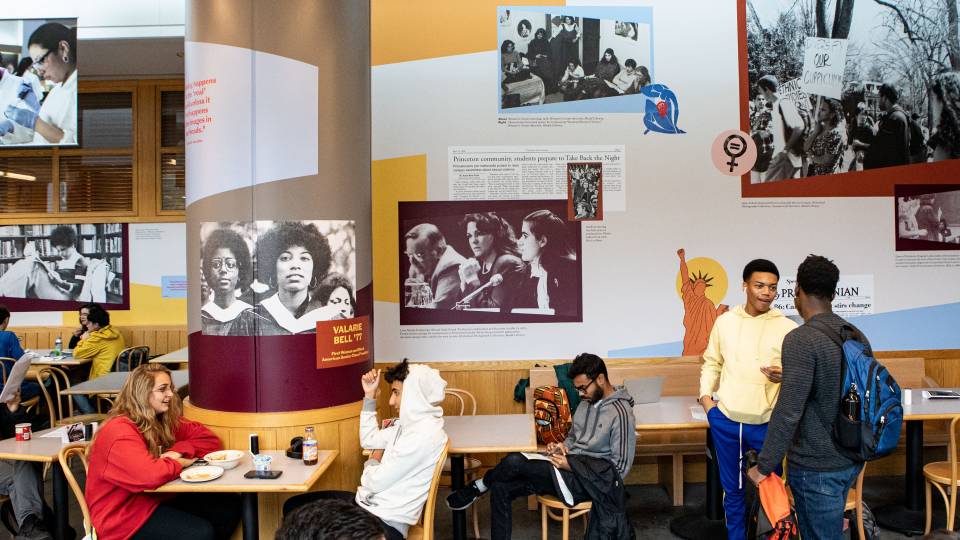From the March 10, 2008, Princeton Weekly Bulletin(Link is external)
When Rhodes Scholar Lillian Pierce met Queen Elizabeth II at a reception at Buckingham Palace, Pierce introduced herself as a mathematician -- and found herself in a familiar situation.
“Not many girls have the head for pure maths,” the queen said.
“I said, ’Well, actually, I think that most women are told that they can’t do math, and then they don’t,’” Pierce recalled. “The amazement she expressed is the amazement I get a lot of the time when I say I do math. … People just don’t believe you do what you do, and that can seem like a criticism once it happens enough times.”
To counter such negative attitudes, Pierce -- a Ph.D. candidate in the Princeton mathematics department who graduated as valedictorian from the University in 2002 -- now leads a campus program aimed at making women more comfortable in the field.

In the fall of 2006, she began Mentoring Möbius, in which she pairs female undergraduates in math courses with student mentors who can provide advice on courses, professors and career options. Primarily, though, the mentors exist to create a sense of community among the young women so that they can encourage and support one another.
The group’s name comes from the Möbius strip, a continuous, one-sided band, and it refers to Pierce’s hope that female students can help others continue to pursue math, as she was helped.
“I had so much good fortune when I was here, in terms of the professors I had and people I met who really encouraged me,” Pierce said. “If I was struggling with a subject or exam, they’d just say, ‘You can do it, I know you can do it,’ and that really mattered.”
Currently, four of the department’s 57 junior and senior majors are women. About 17 undergraduates are in Mentoring Möbius. Pierce matches freshmen and sophomores with junior or senior mentors who, in turn, are paired with graduate students. Then it’s up to the students to meet as often as they would like, Pierce said.
Many female students are passionate about math but drift out of the department, Pierce said. While the mathematics department is warm and welcoming, she said, students can be intimidated by the gifted faculty and overwhelmed by the new material in the introductory courses. In addition, female students who struggle with challenging material may begin to believe something they’ve heard often -- that women aren’t as good at math as men, Pierce said.
Junior Katherine Sanden said that professors, teaching assistants and her Mentoring Möbius cohorts have helped her thrive in the department.
“In my year, there are more than 30 math majors -- and only two girls. That’s kind of sad, because I know of many more girls who were initially interested in math, but got turned off because they were overwhelmed or intimidated. … To succeed in anything hard, you need some sort of support system. The Mentoring Möbius has helped provide that for me,” she said.
Ingrid Daubechies, the William R. Kenan Jr. Professor of Mathematics and Applied and Computational Mathematics and the first female tenured math professor at Princeton, said that she worried about balancing a career and family until she met Cathleen Morawetz, an accomplished mathematician and mother, at a conference.
“It is good, when you find yourself in a small minority, to meet others like you,” she said. “It can be fun to discuss with someone who has been in that same situation and share a laugh about some of the incidents you find you both experienced. And it can be exhilarating to discuss math seriously in a group of only women.”
Mentoring Möbius also helped sophomore Yoonju Kim decide to major in math, though the difficult coursework led her to doubt her abilities at times.
“It’s really encouraging to see other girls continuing to persevere in math,” Kim said. The Mentoring Möbius program, she said, has “played a major role in convincing me to stick with math, even through times of discouragement -- of which there were plenty!”
The mathematics department would like to have more female majors, and it is open to providing assistance for Mentoring Möbius, said department chair and Eugene Higgins Professor of Mathematics Andrew Wiles.
So far, Pierce only has asked for departmental approval to continue the program, which is featured on the department’s website(Link is external). Mentoring Möbius is a grassroots, low-cost effort, and Pierce has taken advantage of existing University resources and programs to host group events for the Mentoring Möbius students.
For instance, she organized an event called “The Many Faces of Science” to introduce female undergraduates to professors in mathematics, science and engineering, in conjunction with the residential colleges and the Office of the Dean of the College’s “Major Choices” initiative, which is intended to expose students to the full range of academic options at Princeton. Thirty-five students attended the ice cream social in October at Forbes College. Pierce will moderate a discussion with female faculty members from several departments -- including President Shirley M. Tilghman, who is a molecular biologist -- during a “Many Faces of Science Study Break” at 8 p.m. Tuesday, March 25, in the Whitman College Common Room.

Mathematics professor Sun-Yung Alice Chang, who spoke at the fall event, said that in fields dominated by men, programs such as Mentoring Möbius allow for networking and friendly support, as well as making learning more exciting and social.
“Each year, I now see groups of undergraduate women students who are doing very well in mathematics,” Chang said. “I believe activities like the Mentoring Möbius program will help enlarge the group and make a difference in the lives of a number of women students.”
Based on the positive feedback Pierce has received from students and faculty, she contacted 13 departments and programs in science, engineering and finance last fall to suggest the creation of similar mentoring programs. Several departments responded with interest, including the chemistry department, which has begun including undergraduate women in a support group for female graduate students.
Pierce said she recognizes that mentoring is one of a number of steps needed to retain women in math, yet she’s hopeful that the program can help encourage students to stick with the field.
“If they can make it over the hump of adapting to the much harder math classes that everyone faces, they’re going to have a great time in the department,” she said.





